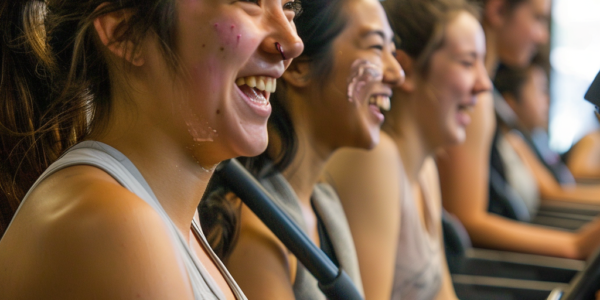Exercise Can Boost Creativity and Focus
Discover how a short bout of exercise can boost your creativity and focus, even if you’re not really into it. Experts explain why movement, not fitness, is the key to shaking loose your best ideas and solutions. Learn how aerobic activity can trigger structural changes in the brain that benefit cognition and creativity, and why divergent thinking seems to be most encouraged by physical activity.
Effects of Makeup on Skin During Exercise
A new study in the Journal of Cosmetic Dermatology reports the results of an intervention study on skin changes following the use of makeup while exercising on a treadmill. The study found that exercise causes changes in healing production, boosts metabolism, and indirectly alters the condition of the skin. The pilot study obtained data from a group of 43 college students without a history of chronic illness, and found that moisture levels, elasticity, number of pores, sebum levels, pH, and temperature all showed significant changes based on the use of cosmetic foundation cream during exercise.
Leisure-Time Physical Activity Beneficial for Stroke Prevention, Study Finds
A recent review published in the Journal of Neurology, Neurosurgery & Psychiatry found that leisure-time physical activity (LTPA) can significantly reduce the risk of stroke. The study analyzed prospective cohort studies and identified three to five levels of LTPA that showed a reduction in stroke risk compared to no LTPA. The authors emphasized the importance of promoting physical activity to combat a sedentary lifestyle and encouraged individuals to strive for the best level of LTPA achievable based on their capabilities.
Dr. Oz Shares 10 Simple Habits to Add Years to Your Life Expectancy
Discover 10 simple habits shared by Dr. Oz on The Dr Oz Show that could potentially add years to one’s life expectancy. From the benefits of aspirin during a heart attack to the importance of regular exercise and maintaining social connections, these habits can significantly contribute to a longer and healthier life.
Sedentary Behavior Increases Mortality Risk
Sedentary behavior, such as sitting for long periods, has been shown to increase the risk of mortality, regardless of exercise levels. A new study published in the Journal of the American Heart Association reveals that older women who sat for 11.7 hours or more per day had a 30 percent increased risk of death. Sedentary behavior reduces blood flow and metabolism, leading to negative health effects that cannot be reversed by exercise.
Study Suggests Women May Benefit More from Exercise than Men
A new study suggests that women may benefit more from exercise than men, with just one weekly strength training session for women equaling three for men in terms of longevity benefits. The study, published in the Journal of the American College of Cardiology, found that women can reap the benefits of working out more than men due to physiological differences. The findings were based on the analysis of self-reported exercise behavior from 400,000 U.S. adults spanning from 1997 to 2017.
Structured Dance Found to be Equal or More Beneficial than Other Physical Exercise for Psychological and Cognitive Outcomes
New research has found that structured dance is equal or more beneficial than other types of physical exercise for improving a range of psychological and cognitive outcomes. Dr Alycia Fong Yang’s research sheds light on the positive impact of structured dance on mental health, providing valuable information for individuals seeking to enhance their mental well-being through physical activities.
Millions of women are ‘under-muscled’. These foods help build strength
Millions of older women in the U.S. don’t consume enough protein, which is critical for maintaining muscle mass as we age. The recommended protein intake is a minimum of 0.8 grams per kilogram of body weight, but many experts say more is optimal. Resistance training and protein-rich foods are key to maximizing strength and preventing muscle-loss.
The Dangers of Prolonged Sitting and How to Counteract Them
Sitting for prolonged periods of time is linked to numerous health issues, including an increased risk of diabetes, high blood pressure, cancer, stroke, heart disease, kidney disease, digestive diseases, and Alzheimer’s disease. New research has found that individuals who spend most of their workday sitting have a 16% higher risk of dying for any reason and are 34% more likely to die from cardiovascular disease. Experts recommend taking a break from sitting every 30 minutes and engaging in exercises such as hip flexor stretches, squats, lunges, and glute bridges to counteract the harmful effects of prolonged sitting.
5 Exercise Routines to Help Control Blood Sugar Levels
Struggling to control your blood sugar levels? Regular exercise is a powerful tool in managing and regulating blood sugar. Incorporate these 5 exercise routines into your daily life to help control blood sugar levels and improve overall well-being.










